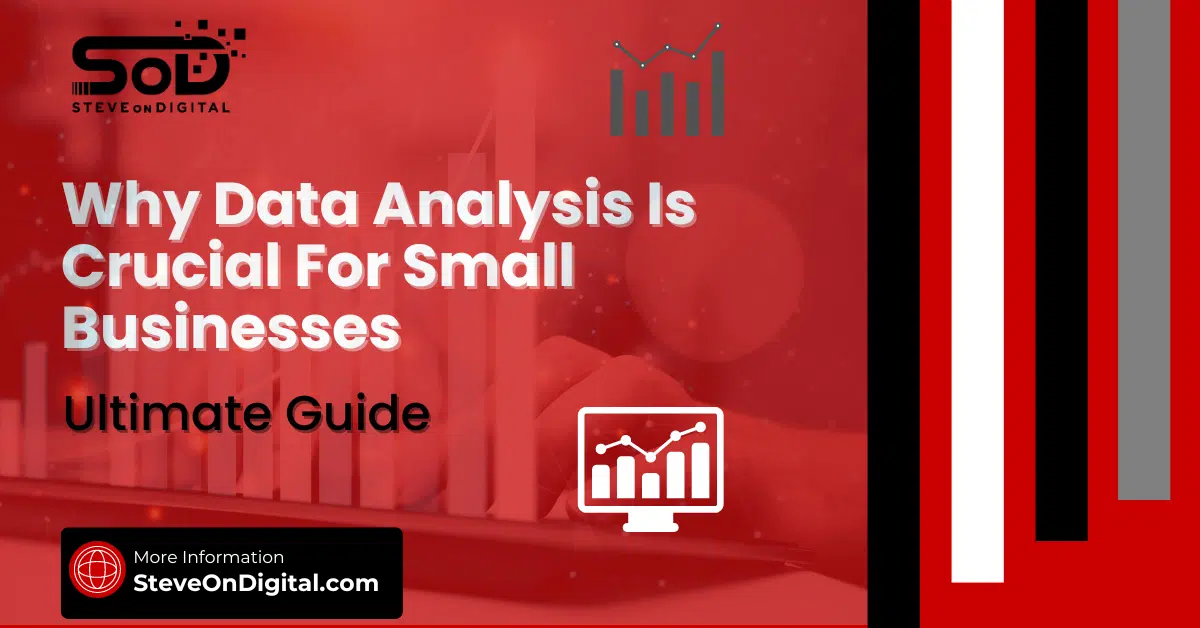In the dynamic world of entrepreneurship, mastering financial management is not just beneficial for small business owners—it’s essential.
The difference between thriving and merely surviving often lies in how well a business manages its finances.
Today, I want to delve into the importance of financial management for small businesses and give you a sneak peek into the 10 financial management tips that are pivotal for success.
The significance of adept financial management in the realm of small businesses cannot be overstated.
With over 30.7 million small businesses fueling the U.S. economy, contributing to 44% of economic activity, and accounting for 1.5 million jobs annually, the impact of these enterprises is profound.
Yet, amidst this vast landscape of innovation and employment, challenges persist, notably in the realm of financial health.
A startling 23% of small business owners identify a lack of capital or cash flow as their primary obstacle.
Now that we understand the critical role of financial management, let’s get started!
1. Financial Planning And Organization
Develop A Comprehensive Budget
The cornerstone of financial health lies in a detailed budget.
It’s a tool that not only forecasts your financial trajectory but also provides a framework for making informed decisions.
Recent trends underscore the growing importance of budgeting, with a significant percentage of small businesses focusing on growth and expansion despite economic uncertainties.
Stay Organized
Keeping meticulous financial records is non-negotiable.
In my journey, the clarity provided by organized records has been instrumental in navigating the complexities of financial management, echoing the sentiments of many small business owners.
Cash Flow Management
Cash flow, the lifeblood of any business, requires vigilant management.
Strategies for forecasting and optimizing cash flow are more crucial than ever, with 28% of small business owners citing it as their upcoming challenge.
Implementing tools for cash flow forecasting can transform unpredictability into a strategic advantage.
2. Investment In Growth And Savings
Strategic Investment
Identifying and seizing growth opportunities is essential.
As of 2024, a notable 41% of small business owners prioritize growth, leveraging strategies such as staff expansion and digital marketing.
My experiences mirror this trend, where judicious investments have paved the way for expansion and innovation.
Setting Aside Savings
An emergency fund is not just a safety net; it’s a strategic reserve that ensures continuity in unforeseen circumstances.
The principle of setting aside savings is a lesson learned through navigating the unpredictable waves of business, reinforcing the need for preparedness.
3. Smart Financing Strategies
Understanding Financing Options
The landscape of financing is diverse, from debt to equity financing.
Interestingly, Rollovers for Business Startups (ROBS) emerged as the most popular financing method in 2023, utilized by 52% of business owners.
This statistic highlights the evolving preferences and strategies in business financing.
Leveraging Loans Wisely
Loans, when used judiciously, can fuel growth and stability.
The key lies in understanding when and how to leverage them, a wisdom gleaned from both statistics and personal experiences.
With various options available, from SBA loans to lines of credit, the choice of financing must align with your business’s unique needs and goals.
Evaluating Funding Options
Exploring various sources of funding is essential for sustained growth.
The landscape is rich with options, each with its own set of advantages and considerations.
In my journey, diversifying funding sources has not only mitigated risks but also opened new avenues for expansion.
4. Credit Management And Tax Planning
Building And Maintaining Good Business Credit
Good business credit isn’t just a number—it’s a reflection of your company’s financial reliability and a key to securing favorable terms on loans and credit lines.
To build and maintain a strong business credit score, start with establishing your business credit with major credit bureaus.
Regularly monitor your credit report for inaccuracies, and ensure timely payments of all business obligations.
A good business credit score can provide access to better financing options, lower interest rates, and more negotiating power with suppliers.
Tax Planning Strategies
Effective tax planning strategies are essential for minimizing liabilities and maximizing your returns.
Consider leveraging tax deductions and credits available for small businesses, such as deductions for office expenses, equipment, and business travel.
Stay proactive by making quarterly estimated tax payments to avoid underpayment penalties.
Implementing retirement plans for yourself and your employees can also offer tax benefits while promoting a stable financial future for everyone involved.
Understanding Tax Obligations
Navigating the maze of tax obligations is pivotal for every small business owner.
Staying informed about federal, state, and local tax requirements is crucial.
This includes understanding the implications of different business structures on your taxes, keeping abreast of changes in tax legislation, and complying with employment tax requirements if you have employees.
Utilizing accounting software can streamline this process, ensuring that you remain compliant and well-informed.
5. Cost Control And Expense Monitoring
Minimizing Costs
Minimizing costs is about making smart choices that don’t compromise the quality of your products or services.
Regularly review and negotiate terms with suppliers to reduce procurement costs. Adopt energy-efficient practices to lower utility bills.
Embrace technology to automate processes and increase efficiency, thereby reducing labor costs without impacting output quality.
Tracking Spending
Effective financial management requires a keen eye on spending.
Utilize accounting software to categorize expenses, monitor cash flow in real time, and make informed financial decisions.
Regular audits of your expenses can reveal areas for cost-saving and prevent budget overruns.
Establishing internal financial protocols ensures adherence to budgets and financial goals.
6. Receivables And Payment Strategies
Optimizing Billing Strategies
A good billing strategy enhances cash inflows and maintains a healthy cash flow.
Implement clear payment terms at the outset of client engagements, offer multiple payment options to make it easy for clients to pay, and send invoices promptly.
Consider early payment discounts and enforce late payment fees to encourage timely payments.
Managing Receivables
Late payments can significantly disrupt your cash flow.
Regularly review your accounts receivable to identify and address late payments early.
Establish a systematic follow-up process for outstanding invoices, including polite reminders, personal follow-ups, and, if necessary, escalation to collection agencies for chronic defaulters.
Strategies For Effective Receivables Management
| Strategy | Description |
| Invoice Promptly and Clearly | Send invoices immediately after delivering a product/service. Ensure the invoice details are clear and payment terms are explicit. |
| Follow Up on Late Payments | Implement a process for following up on overdue invoices, starting with reminders and escalating to more direct collection efforts if necessary. |
| Offer Multiple Payment Options | Make it easier for clients to pay by accepting various payment methods, including online payments, to reduce payment delays. |
| Use Contracts and Agreements | Establish clear payment terms and conditions through contracts to ensure both parties understand their financial obligations. |
7. Professional Advice And Support
Investing In Professional Help
As small business owners, we often wear multiple hats, but one area where it’s wise to seek external expertise is financial management.
Investing in professional help can make a significant difference in your business’s financial health.

Financial advisors and professional accountants offer valuable insights into tax planning, expense management, and investment strategies.
They can also help navigate complex financial landscapes and assist in making informed decisions that align with your business’s growth and stability goals.
Benefits Of Professional Advice:
- Expertise In Taxation And Compliance: Ensures your business adheres to tax laws and leverages tax advantages.
- Strategic Financial Planning: Offers customized strategies to improve profit margins and cash flow.
- Risk Management: Identifies potential financial risks and provides strategies to mitigate them.
From my experience, consulting a financial advisor has provided clarity during uncertain times and helped streamline operations, significantly impacting our bottom line.
The Role Of Accounting Software
In today’s digital age, leveraging technology is non-negotiable.
Accounting software automates and simplifies financial tasks, from tracking expenses and managing invoices to preparing financial statements.
It not only saves time but also reduces the likelihood of errors, ensuring accuracy in your financial records.
Advantages Of Using Accounting Software
- Efficiency: Automates routine tasks, freeing up time to focus on core business activities.
- Accuracy: Minimizes human errors in financial calculations and record-keeping.
- Real-time Financial Insight: Provides up-to-date financial information, enabling quick and informed decisions.
Incorporating accounting software has transformed how we manage our finances, offering real-time insights and enabling us to respond proactively to financial challenges.
8. Financial Health Monitoring
Regular Financial Review
A regular review of your business’s financial health is crucial.
It involves periodically examining financial statements, tracking cash flow, and assessing overall financial performance.
This proactive approach helps identify potential issues before they escalate, ensuring your business remains on track to achieving its financial goals.
Key Components Of Financial Health Monitoring
- Cash Flow Analysis: Ensures there is enough cash to cover day-to-day operations and unexpected expenses.
- Profit And Loss Statement: Provides insights into operational efficiency and profitability.
- Balance Sheet Review: Offers a snapshot of the company’s financial health, including assets, liabilities, and equity.
My routine financial health checks have been instrumental in maintaining a stable financial foundation for my business, allowing for strategic adjustments in response to market changes.
| Tool | Purpose | Benefits |
| Cash Flow Statement | Tracks the flow of cash in and out of the business, helping identify cash flow trends and potential issues. | Enables timely adjustments to maintain positive cash flow and avoid liquidity issues. |
| Income Statement (P&L) | Provides a summary of the business’s revenues, expenses, and profits/losses over a specific period. | Offers insights into profitability and areas where cost reductions or revenue enhancements can be made. |
| Balance Sheet | Shows the business’s assets, liabilities, and owner’s equity at a specific point in time. | Helps assess the company’s financial stability and solvency, supporting strategic financial planning. |
Analyzing Financial Statements
Understanding your financial statements is essential for effective financial management.
The balance sheet, income statement, and cash flow statement each offer different insights into your business’s financial health, from liquidity and solvency to profitability and cash flow efficiency.
Importance Of Financial Statement Analysis
Informed Decision Making: Guides strategic business decisions based on financial data.
Financial Transparency: Provides a clear view of the business’s financial health for stakeholders.
Performance Tracking: Helps monitor financial performance against goals and industry benchmarks.
Analyzing these statements has empowered me to make data-driven decisions, enhancing our financial strategy and steering the business toward sustainable growth.
9. Financial Discipline And Protocols
Establishing Financial Goals
Setting clear, achievable financial goals is vital for small business success.

Whether short-term objectives like improving cash flow or long-term goals like expanding your business, having a roadmap guides your financial strategy and decision-making process.
Steps To Establish Financial Goals
- Assess Current Financial Situation: Understand where your business stands today.
- Define Clear, Measurable Objectives: Set specific targets to aim for.
- Create An Action Plan: Outline steps to achieve these goals, including timelines and milestones.
My experience has shown that well-defined financial goals provide direction and motivation, driving the business forward with purpose.
Developing Good Financial Habits
Good financial habits form the foundation of effective financial management.
This includes regular monitoring of cash flow, prudent expense management, timely tax payments, and maintaining a buffer for unexpected expenses.
Cultivating these habits ensures your business operates within its means and remains financially healthy.
Key Financial Habits For Success
- Budget Adherence: Stick to your budget to control spending.
- Regular Financial Reviews: Keep a close eye on your financial performance.
- Proactive Financial Planning: Anticipate future financial needs and plan accordingly.
Incorporating these habits has not only helped in maintaining a robust financial position but also in fostering a culture of financial discipline within my business.
10. Separating Personal And Business Finances
Benefits Of Financial Separation
One of the most critical steps in establishing and maintaining the financial health of your business is to separate your personal and business finances.
This separation protects your personal assets from business liabilities and simplifies accounting and tax preparation processes.
When personal and business finances are intertwined, it can lead to a complex situation that makes it difficult to track the profitability of your business, manage business expenses, and meet tax obligations effectively.
| Benefit | Description |
| Protection of Personal Assets | Keeps personal assets safe from business liabilities, ensuring that personal savings and property are not affected by business debts or legal issues. |
| Simplified Accounting | Makes bookkeeping more straightforward, allowing for a clearer understanding of the business’s financial performance without the confusion of mixed transactions. |
| Easier Tax Preparation | Helps in identifying deductible business expenses more easily and ensures accurate reporting of business income, avoiding complications during tax season. |
Protecting Personal Assets: By keeping personal and business finances separate, you safeguard your personal assets from any debts or legal issues that your business may encounter.
Simplifying Accounting: Separation makes bookkeeping more straightforward, enabling you to have a clearer understanding of your business’s financial health.
Facilitating Tax Preparation: It simplifies the process of filing taxes, ensuring that you can easily identify deductible expenses and report income accurately.
How To Effectively Separate Finances
Separating your finances involves more than just having different bank accounts.

It’s about establishing a framework that treats your business as an independent entity.
- Open A Business Bank Account: Start by opening a bank account solely for your business transactions. This account should be used for all business-related inflows and outflows.
- Obtain A Business Credit Card: Apply for a credit card under your business’s name to manage business expenses and build your business credit history.
- Use Accounting Software: Implement accounting software to manage your business finances. Tools like QuickBooks, Xero, or FreshBooks offer features tailored to small businesses, including expense tracking, invoicing, and financial reporting.
- Pay Yourself A Salary: Treat yourself as an employee of your business and pay yourself a regular salary. This practice helps maintain the financial distinction between personal and business finances.
In my journey, taking these steps not only helped me in managing my finances more effectively but also provided peace of mind knowing that my personal finances were secure.
Conclusion
To recap, here are the 10 financial management tips for small businesses we’ve covered:
- Financial Planning and Organization
- Investment in Growth and Savings
- Smart Financing Strategies
- Credit Management and Tax Planning
- Cost Control and Expense Monitoring
- Receivables and Payment Strategies
- Professional Advice and Support
- Financial Health Monitoring
- Financial Discipline and Protocols
- Separating Personal and Business Finances
Each of these tips plays a vital role in securing the financial health of your business and positioning it for future growth.
Implementing these strategies can be a game-changer, especially in today’s competitive and ever-changing business environment.
From my experience, taking proactive measures in financial management has not only safeguarded my business during tough times but also paved the way for its expansion and success.
I encourage all small business owners to integrate these financial management practices into their daily operations.
It may require effort and discipline at the outset, but the long-term benefits for your business’s stability and growth are immeasurable.
Remember, the journey of entrepreneurship is filled with challenges, but with sound financial management, you can navigate your way to success and sustainability.




